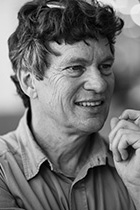Harry Wels appointed Extraordinary Professor at University of the Western Cape

Harry Wels has been appointed Extraordinary Professor at the Department of Women's and Gender Studies (WGS) at the University of the Western Cape (UWC) in South Africa. His appointment will be in the field of 'animal-human relations in nature conservation in South and southern Africa with special emphases on women and gender'. Harry has already been working with a colleague at WGS, Professor Tammy Shefer, for many years on the topic of multispecies organisational ethnography in the context of nature conservation in South and southern Africa. At the beginning of July they will present a joint paper at the MEAM (Multispecies Ethnography and Artistic Methods) Conference in Liège, Belgium, entitled 'On “multispecies intersectionality”: Exploring a microbial perspective'. The appointment as Extraordinary Professor is for a period of three years, with options for extension.
Harry's research is primarily focused on South and Southern Africa and is about organisational structures of cooperation in the context of nature conservation and touches on and relates to broader issues in Human-Animal studies. He is the convenor of the ASCL Collaborative Research Group Trans-species perspectives on African Studies and publications manager at the ASCL.
In 1959, South African Parliament adopted legislation establishing the University College of the Western Cape as a constituent college of the University of South Africa for people classified as 'Coloured'. The first group of 166 students enrolled in 1960. They were offered limited training for lower to middle-level positions in schools, the civil service and other institutions designed to serve a separated Coloured community. In 1970, the institution gained university status and was able to award its own degrees and diplomas. Protest action by students and black academic staff led to the appointment, in 1975, of the first black Rector. In its mission statement of 1982, the university formally rejected the apartheid ideology on which it was established, adopting a declaration of nonracialism and 'a firm commitment to the development of the Third World communities in South Africa.' In 1983, the university finally gained its autonomy on the same terms as the established 'white' institutions. Under the leadership of Professor Jakes Gerwel, who took office as Rector in 1987, UWC aligned with the mass democratic movement. The university also formalised its 'open' admissions policy, providing access to a growing number of African students, and paving the way for rapid growth. The late President Nelson Mandela lauded UWC for having transformed itself 'from an apartheid ethnic institution to a proud national asset' (UWC history).

